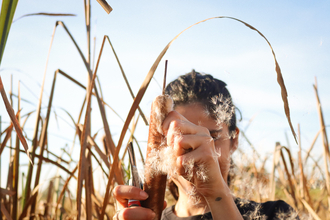Rindle Field in Chat Moss near Salford was once a waterlogged field containing an unprofitable crop of potatoes, now it is home to celery, lettuce and blueberries all grown as part of a climate friendly wetter farming trial. And now new funding of nearly £150,000 from the Carbon Innovation Fund – a Co-op and Co-op Foundation partnership - will see the trial continued into the future.
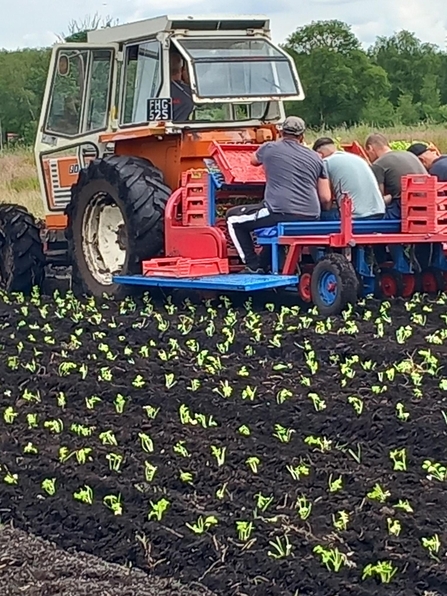
Planting lettuce at the Rindle wetter farming trial - Mike Longden
Wetter farming, also known as paludiculture, is the practice of restoring the naturally higher water table on fields which have been previously drained (often from lowland peatlands). Draining the water from naturally wet and boggy peatlands to convert them to traditional farmland causes the release of large amounts of carbon from the land, however by re-wetting these areas the carbon is locked back underground and these harmful emissions can be significantly reduced. Farmers can then grow crops which thrive in these wetter conditions, allowing the land to remain productive and profitable.
Read our blog | What is wetter farming?
Sarah Johnson, Head of Peatland Recovery at The Wildlife Trust for Lancashire, Manchester & North Merseyside said: “Our lowland peatlands are in trouble. Drained and converted to agricultural use, they are responsible for 3 per cent of UK greenhouse gas emissions*, along with becoming increasingly difficult to farm. We believe that wetter farming could provide a sustainable solution to both of these issues, restoring the carbon storage capacity of our peat whilst keeping them productive and financially viable for our farmers.”
Drained and converted to agricultural use, they are responsible for 3 per cent of UK greenhouse gas emissions
The wetter farming trial at Rindle Field is now in its third year, growing different crops at different water table depths to see how they fare. Researchers from Liverpool John Moores University are also closely monitoring the carbon and other greenhouse gas emissions from the site to see how these are affected by the different options, looking to find that ‘sweet spot’ between the most productive crop and lowest emissions.
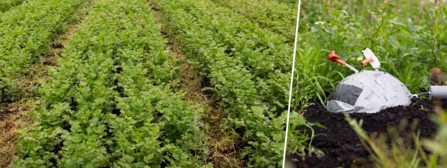
Celery crop grown on Rindle wetter farming trial field - Credit A.J.Critch Wildlife (left) | Monitoring equipment on Rindle wetter farming trial field - Credit A.J,Critch Wildlife (right)
The new funding from the Carbon Innovation Fund will allow the continuation of the trial, testing the compatibility of crops with wetter farming conditions creating a vital data set which can be shared with farmers looking to switch to a more sustainable way of managing their land in the future.
Aruna Bahia, Funding and Partnerships Manager at Co-op Foundation said: “We’re excited that our Carbon Innovation Fund partnership with Co-op is supporting organisations to develop innovative ways to grow the food we need without damaging precious UK peatlands. Growing food in a way that works with nature and reduces carbon emissions is a vital part of how we want to build sustainable communities together with our funded partners.”
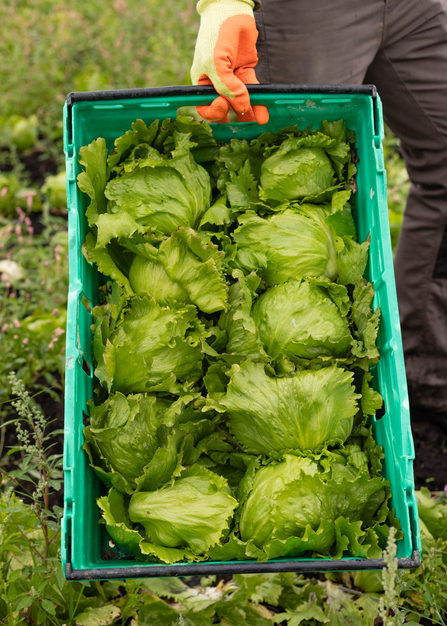
Harvested lettuce on the Rindle wetter farming trial field - Credit A.J.Critch Wildlife
The Wildlife Trust will also now be able to trial planting their first winter crop of potentially kale or beetroot to increase productivity and further protect the peat soils and reduce greenhouse gas emissions.
Farming on lowland peatlands has long been part of our agricultural system, and these areas currently provide 22 per cent of the UK’s total vegetable supply – approximately 950,000 tonnes per year*. However, they contribute disproportionately to greenhouse gas emissions; covering just 2.26 per cent of UK farmland, but accounting for 29 per cent of total UK agricultural emissions*.
Sarah Johnson continues; “Wetter farming practices could help to keep some lowland agricultural peatlands productive and profitable for farmers whilst also helping to safeguard the future of our planet and reach net zero goals. This new funding from the Carbon Innovation Fund will allow us to continue the trial creating practical information for farmers and policy makers on what works, what doesn’t and what we need to trial next.”
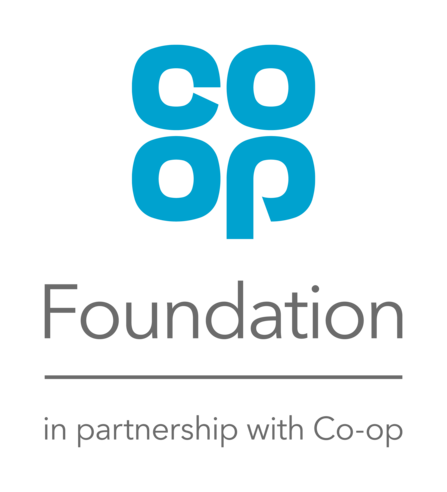
The Carbon Innovation Fund is a three-year, £3.5m partnership between Co-op and their charity Co-op Foundation to tackle greenhouse gas emissions in the food and farming sector. It is funded through Co-op donations from the sale of compostable carrier bags in the UK, as well as the Foundation’s own funds.
Find out more about our other wetter farming trials
* Drained lowland peatlands are responsible for 3 per cent of UK greenhouse gas emissions - UK Centre for Ecology & Hydrology
* Horticultural lowland peat soils provide 22% of the UK’s total vegetable supply – approximately 950,000 tonnes per year – The Wildlife Trust’s calculations based on figures from Defra (2022) Horticulture statistics; WWF (2023) Vegetable Production on Lowland Peat report.
* 2.26% of UK farmland is on lowland peat but emissions from lowland peatlands make up 29% of total UK agricultural emissions – The Wildlife Trust’s calculations based on figures from Defra (2022) Agriculture in the United Kingdom statistics; ONS (2019) UK Natural Capital for Peatlands; Defra (2022) Agri-climate report.

